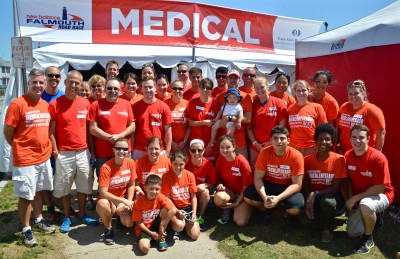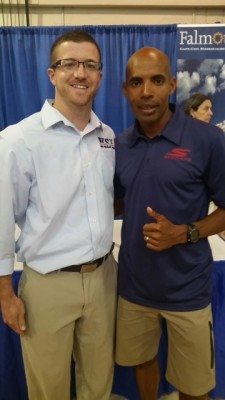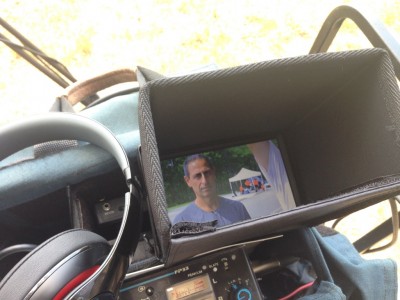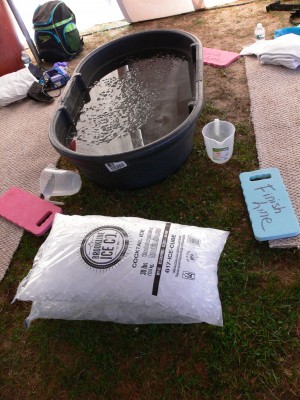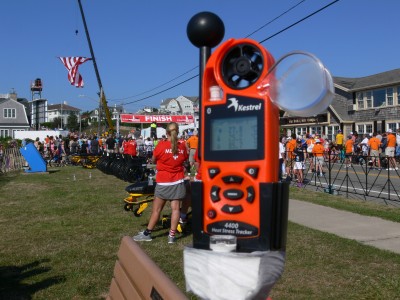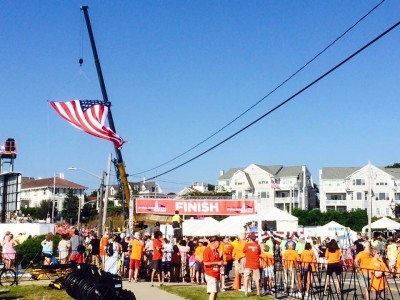By Yuri Hosokawa, Director of Communication and Education
Korey Stringer Institute had another successful year working with the Falmouth Road Race, which took place on Sunday August 16th. KSI and the Falmouth Road Race expanded their collaboration together even further this year. On August 13th, William Adams, Director of Sports Safety Policies, Yuri Hosokawa, Director of Communication and Education, and Rachel Katch, Assistant Director of Research, presented at the 1st Annual New Balance Falmouth Road Race Sports Medicine Symposium, with Dr. John Jardine, Chief Medical Advisor of KSI. This was the first time that Falmouth Road Race hosted a medical symposium for local medical professionals and volunteers who have traveled across the country to work at the medical tent on race day. At the symposium, Adams presented on evidence based prevention, treatment, and care of exertional heat stroke, Hosokawa presented on emerging topics on sudden cardiac arrest in runners, and Katch presented on exertional hyponatremia and best practices for hydration. On August 15th, Dr. Robert Huggins, Vice President of Research and Elite Athlete Health and Performance, spoke at the EXPO on maximizing athletic performance in the heat.
Also during race weekend, we had the opportunity to invite professional videographers to film interviews with Richard Dodakian, one of the exertional heat stroke survivors from the Falmouth Road Race, and Huggins. As they recalled the same event from 2013’s race, it was incredible to hear their stories from different perspectives—exertional heat stroke victim/survivor and the rescuer. The interview is currently under production. Please follow our social media and webpage for the video release. Their words will change the way you view medical care provided at the road race for thousands of runners. Remember, exertional heat stroke is 100% survivable with prompt recognition and appropriate care: cool first, transport second.
This year’s race was very warm and humid, setting a perfect storm for exertional heat illness risk. To counter that, the road race organizers came prepared with rows of cold water immersion tubs and stations, with close to 200 medical professionals volunteering on the race day. KSI primarily assisted in the care of exertional heat stroke patients, educating the medical volunteers who are unfamiliar with the condition at the pre-race medical meeting and serving as leaders at each cooling station.
We were also fortunate to have representatives from our corporate partners, Kestrel and MissionAthlete Care, to join us at the race as volunteer. It was their first time to experience the intensity of a road race medical tent and see the treatment of exertional heat stroke cases.
Lastly, Hosokawa and Katch conducted the third field research study at the Falmouth Road Race, looking into the inflammatory response observed in runners completing the race. The study started 4 weeks before race, where the participants were asked to log their training. In addition, researchers invited the participants to the University of Connecticut campus to complete VO2max and lactate threshold testing to examine their fitness level prior to the race. Hosokawa is also working in collaboration with the EC Lee Lab, lead by Dr. Elaine Lee, at the University of Connecticut, to investigate potential genetic markers that may explain the variations of heat tolerance observed in runners. Our hope is to provide evidence-based recommendations for runners who are participating in the summer races and assist the Falmouth Road Race to become one of the safest summer road races in the world.
Falmouth Road Race weekend is by far the busied but most exciting weekend for KSI. We hope that our collaboration with the race will continue to grow in future years and hopefully inspire other races to have similar partnerships with KSI.
